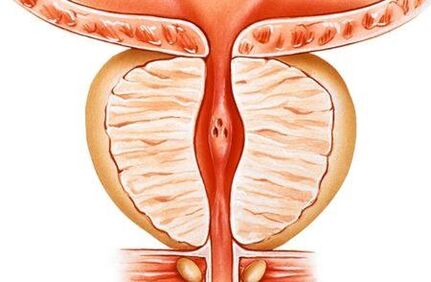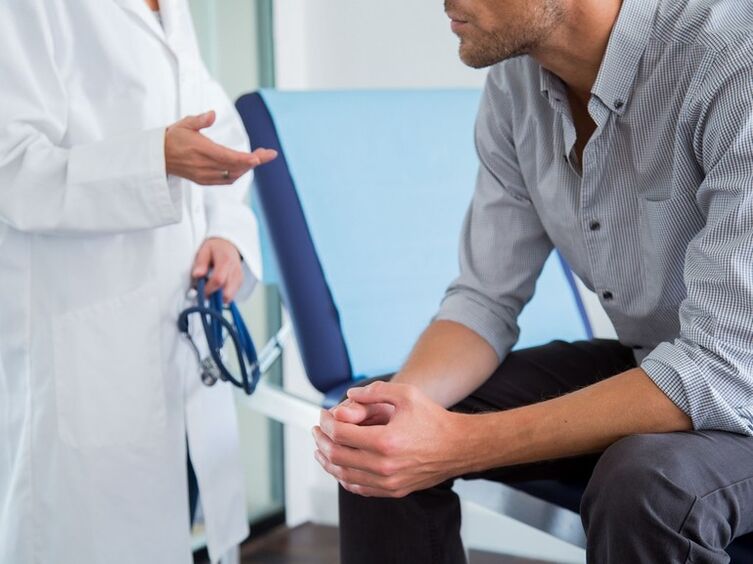Inflammation of the prostate, ie prostate, regardless of the cause of the disease, generally usually receives a chronic course. In order for the effective treatment of chronic prostatitis to be achieved, you must know for reasons.

Good health, dear readers. Alexander Burusov is an expert in the Viva Man Men's Club, and we understand the problem of chronic prostatitis, its causes, symptoms and treatment options.
In this article we will try to find out what this terrible disease treats better, which options are available to us. Let us start analyzing the most modern and effective methods for the treatment of prostatitis in men.
What is prostatitis?
Prostatitis is referred to as inflammation of the prostate gland. It can enter the body by weakening immunity, infection, hypothermia, stress, inactive lifestyle, active or vice versa, irregular sex life.
The prostate iron or prostate is part of the male reproductive system. It is the basis of the urethra. The size of the prostate can be compared with the size of the walnut. The main function of this organ is the development of a secret that is responsible for the activity of sperm.
There are 4 types of diseases:
- Chronic bacteria.
- Chronic, not associated with the development of bacteria.
- Chronically asymptomatic.
- Sharp.
All other types of prostatitis have no pronounced manifestations, so it is always difficult to diagnose them. The main symptoms of chronic disease are:

- Pain in the lower abdomen (can be put on the back).
- Discharge from the urethra (can be transparent or purulent).
- Sexual functional disorders.
- Major urination.
Prostatitis can occur asymptomatic and is only diagnosed on the basis of the test results. It can be created in a man for over 25 years. After 35 years, the risk of its development increases significantly, and for 45-year-olds the probability of prostatitis is 50%. In adulthood, it is therefore necessary to carry out an examination of the urologist annually, which will help to recognize the disease in an early stage and to start treatment in time.
Diagnosis of the disease
Only a urologist can determine the presence of prostatitis. After the inspection, he can appoint an additional exam:
- The physical examination is a palpation of a prostate in which it is possible to determine the condition and size of the gland.
- Transrectal ultrasound.
- Analysis of the smear or the secret of the prostate on the presence of leukocytes and bacteria.
- Clinical urine analysis in which protein, leukocytes and bacteria can be found.
- Ejaculate analysis.
- Cytological urine analysis.
- Bacteriological urine analysis.
- Analysis of the dog's protein level.
- Urodynamic study.
- Cytoscopy. It can only be assigned if there are signs of injuries or to prepare for the company.
Causes and worsening of the disease
Inflammatory diseases of the genitator system, rectum, lead to the formation of the inflammatory focus in IT due to the tight contact with the prostate gland. The vessels that feed the prostate are the branches of the artery of the bladder, rectum, the rear sacral artery, the deep artery of the thigh. Any infectious focus available in these organs can fall into the iron.

The presence of a chronic infection of any localization, such as the nasal caves, leads to a weakening of immunity, and in the intestinal, urethra - pathogenic microorganisms are pathogenic. This leads to the development of the chronic process.
Violation of the circulation of the prostate due to the blood stagnation against the background of a reduced physical activity leads to a deterioration in the drug flow to the prostate gland and complicates the treatment of chronic prostatitis in men.
The increase in blood flow to the organs in the pelvis is not only due to low physical activity, but also due to a number of factors:
- irregular sex life;
- Interruption of sexual intercourse;
- Smoking, alcohol;
- Varicose veins of the lower extremities;
- Paraproctitis and proctitis;
- Thrombophlebitis hemorrhoids veins against the background of chronic hemorrhoids;
- Cracks and fistulas of the anus;
- The tone of the vessel wall is regulated by the sympathetic and parasympathetic nervous system, the disease of which is disturbed by the river and the blood drainage from the organ;
- A trauma for the step among drivers, cyclists and motorcyclists.
In the case of sexual urogenital infections, the disease does not always come to heal - this is the cause of the development of chronic prostatitis. The most common pathogens are:
- Trichomonas;
- Mycoplasms;
- Gonococci;
- Gardnerella;
- Urea;
- Chlamydia;
- Mushrooms;
- Viruses;
- E. coli;
- Streptococci;
- Enterococci;
- Staphylococci.

These microorganisms are difficult to heal.
The hormonal activity after 40 years in a man begins to fade. First it flows asymptomatic.
A reduction in the production of testosterone repeatedly leads to a slight stagnation of the secretion of the prostate gland in its granulate. Gradually, this stagnation increases. Substances contained in the secret of prostate are not completely removed. The secretor, motor barrier function of the secretion of the prostate begins to suffer.
Cymonic acid in prostate juice carries out a bactericide function, dilutes it. The stagnation of citric acid is not sufficient, a bacterial infection begins to develop. The degree of citric acid in the prostate juice is directly connected to the amount of testosterone in the blood.
Clinical image of the disease
Symptoms of chronic prostatitis in men:
- Sensations of complaints, pain over the Schubis;
- The pain shoots regularly in the rectum and sacrum;
- increased urination and pain, especially after hypothermia, stress;
- Uncharacteristic discharge;
- Violations of ejaculation, erection;
- early ejaculation;
- increased sweating;
- Impairment of sleep;
- Periodic increase in body temperature no more than 37, 2-37, 3 0 C in the evening.

The symptoms arise from the symptoms: pain, urination or sexual dysfunction - the treatment of chronic prostatitis in men depends on it.
The main components of the treatment of the disease
It is necessary to highlight the main treatment areas:
- Medicines;
- Normalization of the regime of work and calm;
- rational nutrition;
- Rejection of bad habits;
- Physocalization, massage;
- Folk remedy.
Drug treatment
Effective treatment of prostatitis should aim to eliminate the cause of prostatitis. Medicines are selected individually by a doctor after carrying out the necessary diagnostic studies. Let us analyze how and how prostatitis is treated if it has already acquired a chronic form. The main instructions of drug therapy:
- Antibiotics;
- anti -inflammatory medication;
- Anti -spas modos to improve urine outflow;
- UrantiSeptics to remove infections of the urine system;
- Preparations that improve the arterial and venous blood circulation;
- Medicines that improve the liquid and reduce blood viscosity;
- Vitamins;
- Enzymes;
- Seastant, psychotherapeutic effects;
- Correction of immune disorders;
- Treatment of metabolic diseases and hormonal dysfunctions.
Antibacterial therapy
Whether we heal chronic prostatitis depends on good -looking antibacterial therapy. It is important to note that the therapy and the treatment of prostatitis will only be as effective as possible if the nature and stage of the disease are properly determined.
Antibiotics are selected by those who penetrate the prostate well and have an effectively effect on the pathogen. Some pathogens of chronic prostatitis, such as urea, are not sensitive to such strong medication as:

- Tetracycline;
- some cephalosporins;
- Levofloxacin;
- Clarithromycin.
Non -steroidal anti -inflammatory medication
The effect of non -steroidal anti -inflammatory drug (NSAIDS) is associated with the normalization of the permeability of the vessel wall and the restoration of the microcirculation. They reduce education and do not allow the existing inflammatory mediators to be absorbed. We have to remember the property of NSAIDS that form ulcers in the stomach and duodenum.
It is most rational to use rational candles with NPS like Indomethacin.
Normalization of blood flow with medication
The normal blood flow is reached with an appropriate diameter of arteries that bring blood into veins that lie from the blood drainage of oxygen. It is also necessary to reduce blood viscosity and to achieve its good fluidity in the capillary canal.
In order to achieve a good result for the treatment of chronic diseases of the prostate, inflammatory diseases of the urethra, bladder and kidneys must be treated. Medicines are used for this purpose:
Prostatitis inevitably reduces the effectiveness, weakens the libido, disturbs the erection. These phenomena are always accompanied by symptoms of a dysphoria, a reduced mood background and mood swings. These symptoms prescribe sedative, anxiolytics and antidepressants.
Phytotherapy
It is known that herbal medicine is an alternative to the use of medicinal products in the treatment of many diseases. Is it possible to heal prostatitis with his help? Very often, doctors, medical herbs (licorice, nettles, peony, cooking bananas, St. John's spice, etc. ), often recommend. All of these plants contain a lot of selenium and zinc. However, they only need to be used as part of the complex therapy. As a rule, the decoctions of these herbs are used for bathrooms.
Physiotherapeutic influences
The following treatment methods for the chronic process are used to influence the prostate:

- Ultrasonic
- Electrophoresis;
- Baths with hot water with chamomile, linden, sage, thyme;
- Warm fine
- Prostate massage through the rectum;
- Hirudotherapy
- UHF;
- Inductothermia;
- Microwave resonance therapy.
The severity of psychological deviations and depressive manifestations depends on how much chronic prostatitis is treated. In order to speed up the process for treatment, physiotherapeutic exposure methods must be added in the absence of contraindications.
Nutrition recommendations
Standard matters for all chronic diseases in the form of rejection of fried, salty, praised, smoked, smoked in this situation are inadequate. Effective treatment of prostatitis depends on the rational, balanced diet. It is necessary to add food such as celery, ginger, turmeric and apibodies.
They contain:
- Silicon that normalizes the formation of hormones in the body;
- B -Vitamine, remove toxins and restore redox processes.
- Chromium, Germanium, selenium, zinc normalize the work of a likeable and parasympathetic system;
- Vitamins C and the normalization of the permeability of the cell membrane have antioxidant properties;
- Extreme amino acids, Omega 3, which rejuvenate the sexual function.
APITARY used: natural honey, PEG, wallet, royal jelly, dead bees, bees pollen.
Folk treatment
The treatment of chronic prostatitis is open to medical herbs, which should take into account all of these mechanisms for the development of the disease. Then the effect of the therapy is fully achieved.
It is possible to use the following medical herbs:
- Nettle, wise, persistent;
- Mint, cooking banana, hernika;
- Hagebotte, jokes, wormwood;
- Thyme, birch buds, linden flowers;
- Successfully drowned, chamomile, mother herb.
Healing chronic prostatitis depends on the longer use of medicinal herbs according to the scheme in combination with controversial courses in drug therapy.

Decocements are used, infusions for oral administration, for bathrooms, for microclim. It is not recommended not to apply tinctures, ie alcohol -containing drugs. This prevents the successful treatment of chronic urogenital diseases.
All of these drugs have a good effect in the treatment of prostatitis in inflammatory, stagnant, hormonal etiology.
prevention
The better prostatitis will notify a urologist after examining the patient. But as with any other disease, prostatitis is easier to prevent than get rid of the consequences of the disease. This is necessary:
- Lead an active lifestyle. Regular sports prevents stagnating phenomena in the pool and improve blood circulation. A good effect has: swimming, sports, dancing, fitness. At the same time, electricity sports should be avoided.
- Make a proper diet. It is worth restricting the amount of fried, salty, greasy, spicy, inserted and smoked food. The basis of the diet should be: fresh vegetables and fruit, dairy products, muesli. It is important to adhere to the drinking regime.
- Avoid random sexual relationships.
- Keep a regular sex life. For a middle -aged man, the standard is sex several times a week. This contributes to the natural massage of the prostate gland, which significantly reduces the risk of spreading different bacteria.
- It is important to avoid hypothermia.
- Every year it is necessary to undergo an exam by a urologist.
After 35 years, every man is obliged to monitor his health because the risk of prostatitis increases during this period. In order to prevent the occurrence of the disease, it is important to carry out simple preventive measures and regularly carry out a medical examination in order to identify the pathology in the initial phase if it is easy to treat.
































